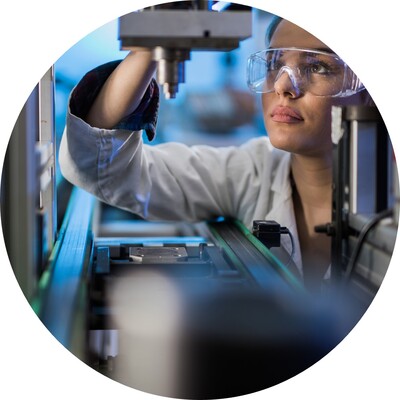Boyden Report Series
What’s Next for Industry? AI, Transformation, and the Talent Imperative
Industrial Trends Report: Analysing markets, studies, and trends on how AI, machine learning, and digitalisation are reshaping the industrial sector, with expert insights on talent and leadership from Boyden’s Global Industrial Practice Members.

Industrial Manufacturing & Automation
Smart Factories, Smarter Leaders: AI in Manufacturing
"As industries continue to embrace AI and digital transformation, organizations are recognizing the power of data-driven decision-making. Leveraging machine learning and automation not only enhances operational efficiency but also fosters innovation. The focus is shifting towards creating agile, customer-centric models that harness emerging technologies, enabling companies to stay competitive in an increasingly digital landscape."
Rickard Ericson
Managing Partner, Sweden
Global Sector Leader, Industrial Manufacturing
- Industrial revolutions, from the 18th Century to Industry 5.0, have shifted us from agrarian to industrial and now a digital economy; tech-focused industry 4.0 gave way to value-focused industry 5.0 amidst cost, supply chain and talent pressures. Today, robots and smart machines work alongside people, freeing humans from repetitive work to focus on creativity and value-add, with organisational strategy rooted in resilience and sustainability.
- The dawn of digital manufacturing has significant implications for regional economies and global competition. China and the US have, arguably, had a head start with technological capabilities both broad and deep. Europe’s industrial sector is on a mission to reinvent itself to compete with global peers. Manufacturers themselves face complex choices in location, assessing government policies on net zero, consumer behaviour, tariffs, regulation, financing and digital talent pools.
- However, one thing is clear. AI has revolutionised manufacturing across the entire process, from enhanced production efficiency, quality control and assurance, supply chain optimisation, personalisation and customisation to sustainability and energy efficiency.
- Machine learning algorithms have created smart manufacturing systems with cloud-based models that bring the tech industry concept of ‘as a service’ to the manufacturing industry, with manufacturing as a service (MaaS) and product as a service (PaaS).
- MaaS allows manufacturers to adapt to changing market conditions, outsource production needs and focus on core capabilities. The benefits are game changing: cost efficiency, scalability, access to expertise, cross-border production, reduced lead times, resource optimisation, innovation and customisation, quality control and reduced environmental impact. MaaS is particularly effective for 3D printing and CNC machining (such as milling machines, lathes, plasma and laser cutters).
- PaaS is a business model that blends products with services in a subscription model, such as after-market repair or replacement contracts. Printing is a good example of PaaS with printers not owned but leased through a service contract, with increased service offerings such as automated ink replacement. Jet engines are another good example of PaaS, with GE, Rolls Royce and Pratt & Whitney charging for power from their jet engines on an hourly basis.
- These developments have enabled the digital integration of customers, partners, suppliers and other stakeholders, with cloud platforms allowing manufacturers seamlessly to share data and real time information with customers, partners and suppliers. This optimises the supply chain, providing for greater flexibility, transparency and agility.
- Manufacturing has also been transformed through digital twins which combined with generative AI creates a symbiotic relationship increasing scalability, accessibility and affordability. While gen AI structures the inputs for digital twins and synthesises their outputs, digital twins provide a robust test-and-learn environment for gen AI. In combining these technologies, manufacturers can reduce costs, increase speed-to-market and generate more value than either as stand alone.
- With digital manufacturing the ‘norm,’ customers and commentators revisit the concept of ‘handmade’. This typically denoted a more ‘special’ and personalised product, creating an almost direct-to-buyer relationship with a ‘master craftsman’. However, as consumers focus on quality, faster delivery and value for money, the use of robotic manufacturing supported by AI and ML algorithms is shifting the mindset.
- While advancements such as cloud-based business models, generative AI and machine learning algorithms, digital twins and shifts in customer behaviour create a positive horizon for manufacturing, there lingers one major concern across the industry worldwide: decarbonisation.
- According to the International Energy Agency (IEA), industrial energy consumption accounts for about a quarter of energy-related CO2 emissions. A challenging sector to decarbonise, concerns centre around time and international cooperation. Low-carbon technologies are still in development or are too expensive, while international government action remains significantly inconsistent and disconnected.
- The IEA advocates for stronger government policies, particularly mandates to reduce CO2 emissions and reduce risks in deploying new technologies to get on track for Net Zero by 2050. Carbon capture, utilisation and storage and use of hydrogen are needed to reach 2030 milestones, with government policy essential to accelerate progress.
- Multilateral forums are also crucial to achieving net zero goals. The Climate Club, which has 44 members from diverse geographies and stages of development, is focused on (i) accelerating the reduction of emissions in the industrial sector through improved common understanding of carbon leakage, (ii) international standards for near-zero and low-emissions materials, and (iii) support for emerging market decarbonisation through the Global Matchmaking Platform (designed to fast-track the decarbonisation of heavy-emitting industries in emerging and developing economies by connecting to technical and financial solutions), operational from COP29.

Climate Club: Global Matchmaking Platform
- The second leaders meeting of the Climate Club was held at COP29 in Baku, with the support of the OECD and IEA as co-hosting institutions for the Climate Club Interim Secretariat. German Chancellor Olaf Scholz, and Co-Chair of the Climate Club states, “The transition of the industrial sector will only be successful if it is done at a global scale. What we need in this phase are cooperative solutions and a common framework which is ambitious, transparent and inclusive. In the Climate Club we come together with 43 countries to work on this framework and to create green lead markets for industrial products and reduce risks, such as carbon leakage, for those countries that implement ambitious climate policies”.
- While at the organisational level much progress is being made, particularly due to AI and ML, governments need to support further technological progress, create and agree global standards for net zero across industry. This will require exceptional government capabilities and executive leadership to implement change.

Redefining Manufacturing Talent: The Rise of Digital-First
- In this complex and fast evolving digital environment, skill requirements in advanced manufacturing are expected to evolve over the next few years. For now, manufacturers are focusing on three core skills: leadership skills; digital skills; and soft skills.
- Over the next 10 years, Deloitte and the Manufacturing Institute forecast a potential 3.8 million net new employees will be needed in manufacturing, and that half of the jobs could remain vacant if talent issues are not resolved.
- Digital skill sets define talent needs in manufacturing today. Over the last five years, analysis by Deloitte reveals a 75 percent increase in demand for skills in simulation and simulation software for mostly tech-enabled production or testing roles. Other skills in exponential demand are enterprise information management, cloud computing, and customer service skills, in keeping with manufacturers increased digital interaction with customers and expanded after-market services.
- Another growth area is skills in employee relations, reflecting competitive efforts to attract and retain highly skilled experts from more diverse talent pools through creating more favourable, worker-friendly environments.
- Growth in demand for soft skills, such as critical thinking, problem-solving and creativity underpin many of the other skills in greater demand, such as customer service, simulation and manufacturing processes.
- According to the US Bureau of Labor Statistics, production-related roles account for the largest group of employees in the industrial sector; this is expected to continue, with a stronger focus on semiconductor-processing technicians, machinists, first-line supervisors, welders and electronics and electro-mechanical assemblers.
- Leadership and soft skills are under the spotlight, with key risks centring on safety hazards, inefficiencies, failure to meet production goals and employee turnover due to bad leadership. The Manufacturing Skills Institute is a strong advocate for leadership development.
- Successful senior leaders are technically and digitally savvy, excelling in digital strategy and transformation and empowering their teams to work differently and continue to digitise existing processes.
Read more on the topic:
- InsideAINews: Revolutionizing manufacturing: the AI impact
- Stibo Systems: Manufacturing as a service
- TechTarget: Product as a service
- McKinsey: Digital twins and generative AI
- McKinsey: Digital twins, the key to smart product development
- World Economic Forum: AI implications on manufacturing
- Forbes: Handmade vs. machine made
- Climate Club
- Climate Club Global Matchmaking Platform
- Deloitte: Talent needs in manufacturing




